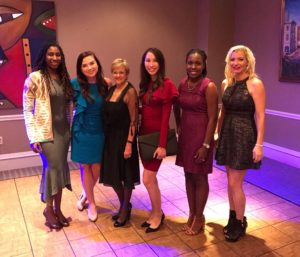
Capital City Club Gala Benefiting The Arc of Alabama, November 2018
Cultivating the next generation of leaders and advocates in the I/DD community is key to the continued success of The Arc and its mission. This is especially true in chapters across the country, where strong community connections can make all the difference in the health and future of a chapter.
Through her junior board, Gena Richardson at The Arc of Alabama is setting an example for what this can look like – and showing how bringing younger members of the community into the movement is both a smart short- AND long-term strategy.
What was your motivation for developing a Junior Board? What is the ultimate goal of the Junior Board?
Junior Boards are known to be an effective and creative way for nonprofit organizations to raise money. It has been my experience they also provide support for the strategic plan, offset some costs related to consulting services, and help build a stronger network.
Tell us how you went about finding the Junior Board members. Where did you find them in the community?
After determining the vision for our Junior Board, I attended community events and networked until I found our core group. It was important for me to look within established groups known to set high expectations for volunteers, and promote leadership development. The majority of our Junior Board members are involved in Rotary, Montgomery Chamber Ambassador Program, or Junior League. I am actively involved with these groups. The Junior Board members knew me, first and foremost, as a fellow volunteer. Once I approached a potential member and extended an offer, they were ready to join our group.
What activities do you engage the Junior Board in to build involvement and engagement in the mission?
I always encourage everyone to have fun. As we added new members each person was assigned duties based on their area of interest and expertise. This will continue to be our protocol. During the first nine months, we participated in a number of events including, but not limited to, a legislative prayer breakfast, Autism and Disability Friendly Day during a Minor League Baseball game, and our upscale fundraiser. 50% of ticket sales were given back to The Arc of Alabama. 100% of the overhead was covered by Capital City Club (a social and business club). Additionally, 100% of silent auction proceeds came back to us.
Has the Junior Board’s presence strengthened your organization’s work, and how so?
The Arc of Alabama’s profile has increased in our local community. When our Bylaws were initially drafted, we felt as though expanding opportunity for membership beyond the Montgomery metropolitan area gave more opportunities for donations, speaking engagements, and increased impact across the state. We have 30 local chapters in Alabama, the majority in underserved rural counties. Soon after our Junior Board was created, we had our foot in the door to speak with representatives from two counties that did not have a local chapter. During the last year, our Junior Board has obtained donations, provided pro bono services and consultations, and helped with regular volunteer activities. The professional backgrounds of our founding group range from behavioral health and disability services, marketing, legal services, accounting, nonprofit management, public policy, and political consulting. While recruiting Junior Board members, our intent was to connect with go-getters of diverse professional backgrounds.
What do you envision as the future of the Junior Board?
If the past is any indicator of what the future holds, it is incredibly bright for the Junior Board. They will continue to do excellent work. Everyone put in considerable time during the first nine months to make sure the Junior Board had a successful start. It was not uncommon for us to meet during nights and weekends. When a dedicated group of go-getters invests that much time, great things happen.









